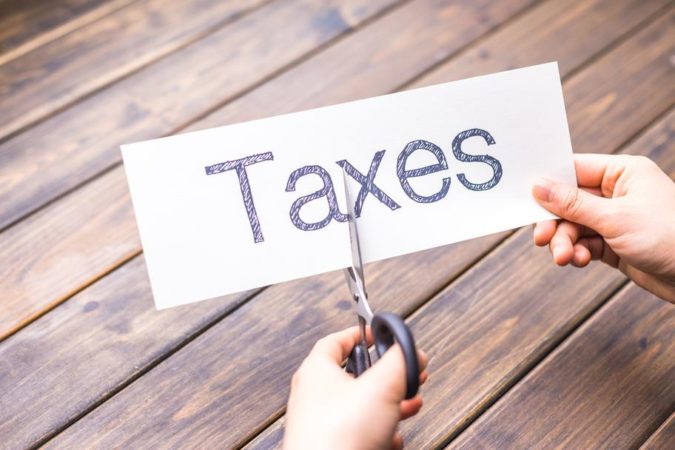Not only are the leading Virginia Senate budget negotiators adamantly opposed to providing Virginians with additional tax relief in this election year, but they are now hinting at partial roll back of one of the major individual tax reforms approved just last year.
When the 2022 General Assembly approved a major increase in the standard deduction used by most Virginia taxpayers, it applied a condition — that the underlying General Fund revenue had to continue to grow at least 5% in both fiscal years 2022 and 2023. If it did not, the standard deduction for that year would be reduced again. The revenue growth would be adjusted for the tax cuts, so the target was 5% growth before the revenue reductions those caused.
Meeting that trigger target for FY 2022 was easy in that year’s overheated economy. Last week Governor Glenn Youngkin’s administration certified that the second target was also met, meaning the full standard deduction also applies for this tax year. The goal was barely met, with growth of 5.1%, leading Democrats to accuse the Department of Taxation of “voodoo estimating.”
The accusation against the usually trusted tax staff was reported in a Richmond Times-Dispatch article. It failed to address whether the Democrats plan to act on their suspicions, but why complain otherwise? If they fight to certify the target was missed, and win, the standard deduction for a married couple filing jointly will drop by $1,000 and their tax bill rise $58. A key Democrat dismissed it as “less than $30” but that is for an individual.
Yes, Virginia, this argument has gotten so petty some legislators are considering trying to claw back a $58 tax break to couples still dealing with the crushing inflation crisis. Of course, the argument is not really about last year’s tax cut but the continuing stalemate over doing it again. The state ended the fiscal year June 30 with billions in cash not dedicated to any purpose, and Youngkin and the House of Delegates want more tax relief.
The certification on meeting the standard deduction revenue target came in a July 25 letter to leading budget negotiators. It reported that all the various tax changes made in 2022 ended up saving taxpayers (some prefer to say “costing the government”) over $2.5 billion in just one year. Almost $1.4 billion of that represented lower personal income taxes, with the higher standard deduction accounting for $1 billion of that amount.
The accounting includes almost $1.1 billion that was passed out to taxpayers as individual rebates. Whether or not that counts as a “tax policy adjustment” is highly debatable. That was basically a spending item with a one-time impact and had zero impact on revenue. In truth, it boosted revenue because it is safe to assume most taxpayers promptly spent it on some taxable item or service.
Remove that rebate from the calculation and the 2023 revenue growth target was easily met. Another round of rebates is also being proposed as a response to the current cash surplus. One-time rebates have become a bipartisan dodge used by legislators embarrassed by the state’s flush treasury but opposed to long term tax cuts.
What really upsets some legislators is how effectively Youngkin is rolling back the many and varied tax increases imposed by former Governor Ralph Northam when he enjoyed total partisan control of the legislature in 2020 and 2021. You can see the impact by looking back at previous General Fund revenue results.
Remember, The General Fund is mainly income and sales taxes paid by both individuals and businesses, with a few smaller revenue streams thrown in. Federal grants, transportation taxes, and college and hospital operating costs are accounted for as Non-General Funds in a different pot. The Northam tax increases exploded the General Fund. (He raised transportation taxes too, but that is not part of this discussion.)
For fiscal year 2020, before any of those tax changes passed, the state’s General Fund total was $21.7 billion. A year later, in 2021, it hit $24.9 billion. Another year and more tax increases later, it reached the recent peak of $28.9 billion. The General Fund grew by one-third in two years despite the COVID pandemic and its related recession. How? Tax increases.
According to the July 25 report from the Department of Taxation, absent the tax policy changes and the rebate the General Fund total would have been $30.4 billion for fiscal year 2023, another increase. But with the tax policy changes and the rebate, the figure is now expected to be $27.9 billion. The tax cuts prevented any increase in the General Fund collections from 2022 to 2023.
But the state’s bills have been paid with cash left over. The amount collected in the past 12 months – after the Youngkin tax cuts — remained almost 28% higher than three years previously, before the wave of Northam tax increases. Had there been no Youngkin tax cuts and no one-time rebate, the $30.4 billion in General Fund for the past 12 months would have represented a 40% increase in just three years.
The fear of recession that the spending advocates used to block tax cuts during the regular session has abated. There is every reason to expect the General Fund to continue to grow even if some additional tax cuts are approved. The voters need to be clearly asked which they prefer: additional tax cuts coupled with substantial growth in spending, or an even higher uptick in spending with no relief to the taxpayer.

Steve Haner is Senior Fellow with the Thomas Jefferson Institute for Public Policy. He may be reached at steve@thomasjeffersoninst.org.






